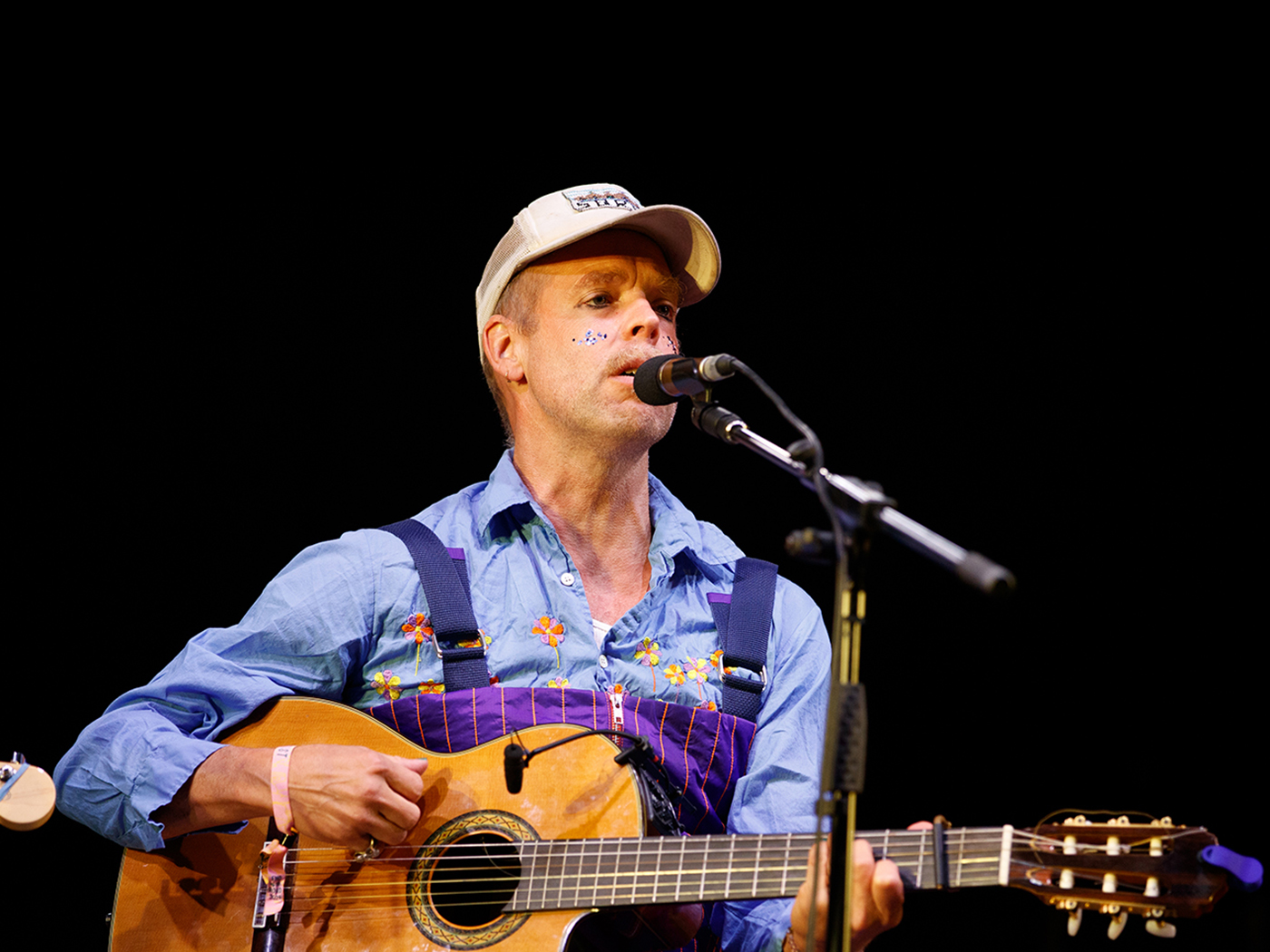
There are strange noises afoot on the outskirts of End Of The Road’s 18th edition. Given the adventurous tastes of this festival, the Folly tent is heaving for Plantoid, Brighton’s latest venture into psych-jazz fusion. With guitarist Tom Coyne effectively earning a doctorate in quantum mathematics with every tumbling riff, singer Chloe Spence delivering cut-glass vocals and their producer Nathan Ridley acting as their tambourine-and-bongo Bez, theirs is a dynamic amalgam of basement bar jazz, creeping minimalism and stabbing rock, with occasional, howling forays into early Genesis.
On The Woods stage, though, it’s very much a gentle introduction to the weekend. Laetitia Sadier, following the Stereolab reunion that rolled through Larmer Tree Gardens a couple of years back, is here in support of her fifth solo album Rooting For Love, containing, in her own words “sonic balm[s] to aid the evolution of Earth’s traumatized civilizations”. Her plan for humanity’s ascendence involves much of her trademark spare Gallic lounge pop, but also a fair bit of star-seeking. In passages inspired by Steve Reich and Terry Riley, she delves into space noise, bubbletronic atmospheres, haunting trombone and vocal echoes resembling 1960s Paris heard from the distance of several shattering dimensions. “Thank you so much for your attentiveness,” Sadier says. Or is it hypnosis?
If Sadier envisions a cosmic future for mankind, Richard Dawson – having sketched out a post-apocalyptic dystopia on 2022’s The Ruby Cord – predicts an earthbound doom. Once he picks up a guitar and salutes the people of Newcastle who “stood up to the arseholes” during the recent right-wing riots, he’s straight into “Museum”, his psych-folk tour of the first AI museum dedicated to humanity, centuries after we’ve made ourselves extinct.
As his future AI protagonist documents our strange addictions to warfare, consumerism and civil unrest, Dawson’s shrill falsetto reaches the volume of an alarm. Elsewhere amongst his vivid folk-literature vignettes, he turns it to more present human experience. “We Picked Apples In A Graveyard Freshly Mowed” is all sparse, lustrous traces of guitar and desolate singing, full of grief and insecurity. “Poly Tunnel” – touted as an upcoming single, “although I suspect when you’ve heard it, you might find that hard to believe” – pictures an old couple finding simple joys in tending an allotment.
Having completed a past-present-future trilogy of albums, Dawson’s songs of haunted houses and sci-fi nightmares present something of a psych-folk Cloud Atlas, and he leans heavily into the experimentalism of the endeavour. When he really freaks out on guitar he makes sounds like Hendrix at a weird Tyneside Woodstock, complete with comedy jigs. Unsettling? “If I expire onstage I’d like you to eat me,” he tells the crowd, directing us to his tastiest innards.
Headliner Bonnie “Prince” Billy has no truck with such rampant pessimism. He’s singing destruction, but happy today. Will Oldham’s songs – comprising gothic Americana, campfire sway-alongs, arpeggiated elegance and country-folk channelling Dylan and Neil Young – are soft, plaintive things but often shot through, tonight, with uplifting positivity.
“Good To My Girls” addresses the importance of good parenthood with a wry jubilance. “Pine, Willow And Oak” divides humanity into three tree-based types, only to advise against bothering with the life-sucking willows and prickly pines in your life in order to find yourself a sturdy oak. “I wanna be wholly consumed in rhyme,” goes “Behold! Be Held!” in a spirit of musical carpe diem, “And then when that gruelling death bell knells we’ll have such a wondrous thing to remember”.
Death, religion, loss and humanity’s insignificance hang behind these songs like a shadow presence. But as the duo of Oldham and guitar-and-woodwind sidekick Thomas Deacon are joined for “I See A Darkness” by a keyboardist adding churchy uplift, songs such as “Good Morning, Popocatépetl” become rousing wassails. “Have you got a ding-dong in you?” Oldham winkingly asks as he summons the crowd to the exuberant church bell chorus of “Crazy Blue Bells”.
Having paid tribute to the fragile wilderness we’re invading and “the people right now that could use a little help”, he ends with the utmost message of hope in the face of a dissolving environment. “Shorelines gone and maps destroyed, livelihoods dissolved and void,” he sings on “This Is Far From Over”. Yet he finds solace in the persistence of the planet itself: “This whole world’s far from over”. Heartening stuff to close one of EOTR’s most thoughtful induction days.







